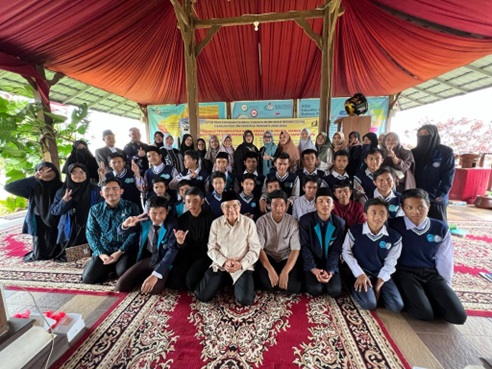Kepemimpinan Menumbuhkan Kreatifitas Siswa dengan Pemanfaatan Media Sosial Leadership Grows Student Creativity by Utilizing Social Media
Main Article Content
Abstract
Teachers, school principals, and heads of foundations will help create change toward achieving school reform. Change can start by fostering creativity, in this case, through social media. The use of social media needs to be understood from an early age. Knowledge and ability to use social media can be trained starting from junior high school level. Especially for schools that aim to produce entrepreneurs. Students can hone and channel their creative ideas through social media, such as making videos, photos, writing, etc. On YouTube, students can channel their creative ideas to make videos. Students can channel their creative ideas on Instagram by writing photos and even videos. Students can also use other applications on social media. This Community Service (PkM) activity aims to provide educational assistance students need at the Islamic Entrepreneurship Boarding School, Global Cahaya Nubuwah Insani Foundation - Purwakarta. Education is provided in the form of business leadership counseling and the use of social media, which would not be realized without the support of teachers, school principals, and foundations.
Downloads
Article Details

This work is licensed under a Creative Commons Attribution-ShareAlike 4.0 International License.
Authors who publish with this journal agree to the following terms:
- Any article on the copyright is retained by the author(s).
- Author grant the journal, right of first publication with the work simultaneously licensed under a Creative Commons Attribution License that allows others to share work with acknowledgment of the work authors and initial publications in this journal.
- Authors are able to enter into a separate, additional contractual arrangements for non-exclusive distribution of published articles of work (eg, post-institutional repository) or publish it in a book, with acknowledgment of its initial publication in this journal.
- Authors are permitted and encouraged to post their work online (e.g., in institutional repositories or on their websites) prior to and during the submission process, as can lead to productive exchanges, as well as earlier and greater citation of published work.
- The article and any associated published material is distributed under the Creative Commons Attribution-ShareAlike 4.0 International License
References
Baliartati, B. O., Nilasari, B. M., & Kristaung, R. (2022). Penyuluhan Peningkatan Motivasi Kerja UMKM pada UMKM Binaan Yayasan Insan Palma Sejahtera di Palmerah Jakarta Barat. Jurnal Akal: Abdimas dan Kearifan Lokal. 3(2), 110-121. https://dx.doi.org/10.25105/Akal.V3i2.
Daft, Richard L. (2018). The Leadership Experience 7th edition, Boston: Cengage Learning, USA
Gumilar, R., Nurdianto, R. R., S, Sartika, S., H., & Srigustini, A. (2023). Sosial media dan digital marketplace sebagai strategi pemasaran BUM Desa. Jurnal Inovasi Hasil Pengabdian Masyarakat, 6(3), 598-609. https://doi.org/10.33474/jipemas.v6i3.19709
Handayani, E., Sari, P.P., Islami, M.J. 2021. Pemanfaatan Teknologi Informasi dan Komunikasi (TIK) oleh UMKM pada Masa Pandemi COVID-19. Jurnal Komunika: Jurnal Komunikasi, Media dan Informatika. 10(2):113–119. https://doi.org/10.31504/komunika.v10i2.4622
Harbani, P. (2008). Kepemimpinan Birokrasi. Bandung: Alfabeta.
Himarosa, R.A., Krisdiyanto, Wardana, P.A., Maulana, N. R., & Sofyantoro, F. (2022). Pemberdayaan UMKM melalui Inovasi Marketing berbasis Teknologi Informasi: Empowering MSMEs through Information Techology-based Marketing Innovation. PengabdianMu : Jurnal Pengabdian Kepada Masyarakat. 7(6), 774–781. https://doi.org/10.33084/pengabdianmu.v7i6.4099
Kuswaeri, Iwa (2016). Kepemimpinan Transformasional Kepala Sekolah. TARBAWI, 2(02): 1-13.
Nilasari, B. M., Jasfar, F., & Wahyudi, A. S. (2019). The Effect of Interactivity, Cost Effectiveness, and Compatibility on the Use of Social Media and its Implications for Organizational Performance. American Research Journal of Business and Management. 5(1): 1-17. https://www.arjonline.org/papers/arjbm/v5-i1/3.pdf
Sujoko, A., Prianti, D. D., Wahyudi, D., & Lestari, M, R. S. (2023). Literasi Media Digital bagi Gen-Z di MAN 1 Kota Malang: Digital Media Literacy for Gen-Z in Islamic Elementary School 1 Malang City. PengabdianMu : Jurnal Pengabidan Kepada Masyarakat. 8(4), 577–585. https://doi.org/10.33084/pengabdianmu.v8i4.4681
Tanoto, Y, Khoswanto, H., Anggono, W., Anggung, K. M., & Setiawan, V. E. (2024). Pemanfaatan teknologi digital marketing untuk menunjang operasional mini-hidroponik berbasis energi terbarukan dan internet of things. Jurnal Inovasi Hasil Pengabdian Masyarakat, 7(1), 20-31. https://doi.org/10.33474/jipemas.v7i1.20871
